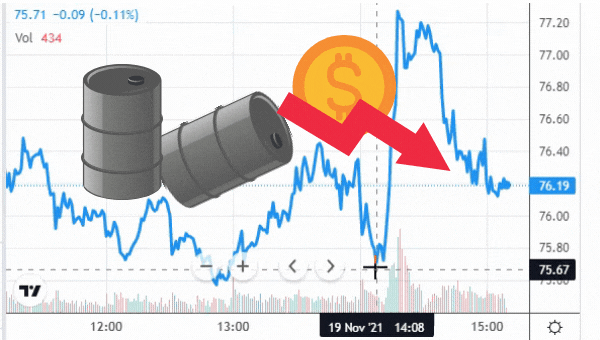The price of crude oil continues to fall on Friday
as the news of the joint release of Strategic Petroleum Reserves, SPRs, started
gathering momentum, although there is no official response in this regard from
any country involved in the unprecedented move.
As of 15:30 GMT, price of WTI and Brent stood at $76.56
and $79.16 respectively – a significant fall, reaching a 7-year-high mark in
October; the prices fell almost by 3%
The development follows the 3-and-half-hour-long
virtual meeting between President Biden and his Chinese counterpart, President
Xi Jinping.
Although both sides refrained from publishing what
was discussed during the relatively long meeting, the Chinese media was upbeat
about the improvement of the ties in certain areas of the world’s top two
economies.
The Chinese media was confident that the current
energy crunch was on top of the agenda during the meeting between the two
leaders and implied that President Biden suggested the joint release of the
strategic petroleum reserves to keep the prices at a reasonable level.
Analysts believe that the Biden administration has
asked Japan, South Korea and India to join the mission that they plan to embark
on along with China. Their response, however, is not clear as of Friday; the
Asian countries in the region have had already made a series of appeals to the
OPEC+ to increase the production, but to no avail.
The rising energy cost has taken its toll on the
economies in Asia as a whole. In this context, it is surprising if they do not
warm to the American idea in the current form.
No doubt, it is a major blow to the OPEC+ in the
short run. In the long run, however, the OPEC+ can hit back by raising the
price of crude oil in order to compensate for the artificially-induced fall in
oil prices.
Since the SPRs are limited quantities, only meant to
be used in emergencies, the joint release of SPRs is never going to be a long
term solution.
With the EIA, the US Energy Information
Administration, predicting a fall in demand at the beginning of next year, the
sudden blow to the revenue generation of the OPEC+ members due to joint release
of the SPRs, can cause some damage beyond the psychological level.
It is not something they anticipated at this time;
certainly no on this scale in a joint manner.
In Europe, meanwhile, the fourth wave of the Coronavirus
has raised its ugly head again with countries going into full lockdown in the
familiar pattern.
Austria is already in full lockdown and Germany
declared a health emergency.
As a result, the demand for crude oil will
dramatically fall in Europe as the winter sets in.
When the crude markets try to absorb the shocks of
the joint release of SPRs, the resurgence of the pandemic can only make matters
worse for the volatile market.







